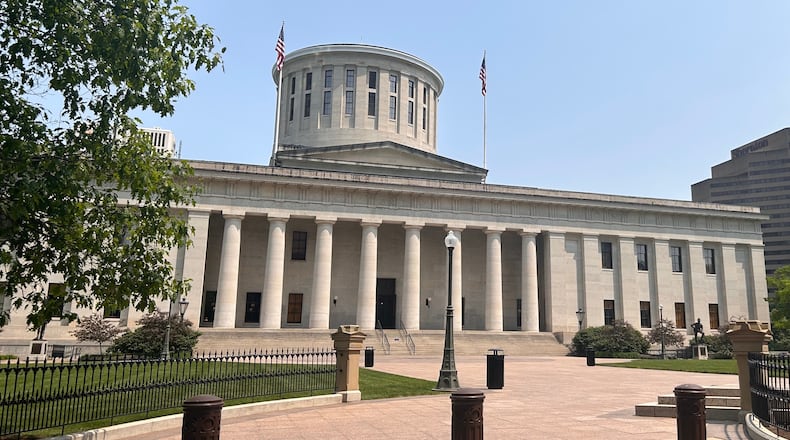This year’s capital budget process combines the state’s regular capital spending projects with a unique and “transformational” $717 million fund of surplus tax revenue that was set aside last year to be used on local projects throughout the state. The fund was expanded considerably from what the state usually puts into special projects, in part because of an influx in federal COVID-related spending.
The measure passed the General Assembly overwhelmingly, though what little opposition there was in both chambers stemmed predominantly from southwest Ohio Republicans.
Montgomery County Sen. Niraj Antani, R-Miami Twp., was the lone vote against the capital budget in the Senate. On the Senate floor, Antani said that he’d rather the $717 million go toward a tax refund of some sort.
“Hardworking Ohioans — business owners, union members, teachers, people in the health care front lines — they could be seeing $700 million of their money being returned to them. But, because we’re choosing to give this to special projects, they are not,” Antani said.
Antani’s tax refund idea was criticized by Senate Minority Leader Nickie Antonio, D-Lakewood, who argued that spreading $717 million among Ohio’s population of nearly 12 million people would result in what she characterized as a paltry sum of tax relief per person.
“Rather than give each person in the state of Ohio $63, we’re actually making investments that are going to transform all of our communities,” Antonio said. She called the capital budget, and particularly the special projects fund, one of best acts of bipartisanship she had seen in recent years.
Sen. Matt Dolan, R-Chagrin Falls, who led Senate deliberations on the capital budget, told his colleagues that the strategic funding bill is a chance for Ohio’s state senators to send a message to constituents that the state is willing to help build communities and spur economic development.
“Every one of us that worked on this bill wanted to make sure that you are reflected in this bill,” Dolan told his colleagues. “Now, when you go back to your communities, you can say, ‘I went out there, I fought for you, I was able to provide a little bit of relief, a little bit of economic opportunity, where I improved your quality of life.”
In the House, H.B 2 was overwhelmingly approved by a 90-5 vote. Four of those objectors — Clark County Rep. Bernie Willis, R-Springfield; Greene County Rep. Bill Dean, R-Xenia; Darke County Rep. Jena Powell, R-Arcanum; and Butler County Rep. Jennifer Gross, R-West Chester — hail from this region.
“Ohioans are hurting economically, yet we spend more and more taxpayer money on a budget that is not required, by statute, to be passed,” Gross told this news outlet via text. Gross said she felt a no vote was the best way to serve her constituents.
Willis said he opposed the bill because he doesn’t believe Clark County received an equitable share of the funds. “Our district’s fair share should be in the tens of millions,” said Willis, who previously complained that House leadership didn’t include him in discussions.
In a joint statement with fellow Montgomery County Reps. Phil Plummer, R-Butler Twp., and Tom Young, R-Washington Twp., following the vote, Rep. Andrea White, R-Kettering, called the now-approved investments “much needed” and predicted that they’ll have a “lasting impact throughout our region for generations to come.”
What’s being funded?
With the $717 million special projects fund, Montgomery County is set to receive $28 million; Warren County $27.9 million; Butler County $17.8 million; Greene County $6.2 million; Clark County $5 million; Miami County $2.5 million; Darke County $1.8 million; Preble County $750,000 and Champaign County $20,000.
With the rest of the capital budget, the state will divert $25.7 million to Butler County; $25.2 million to Montgomery County; $13.8 million to Greene County; $4.7 million to Clark County; $3.9 million to Miami County; $2.5 million to Warren County; $375,000 to Preble County; $373,000 to Champaign County and $170,000 to Darke County.
Notable projects funded by both pools of money include:
• $27.5 million toward the Western & Southern professional tennis tournament in Mason
• $23.1 million to renovate Miami University’s Bachelor Hall in Butler County
• Over $10.5 million in improvements to Wright State University facilities in Greene County
• $10 million to acquire land and design a 200-bed, state-run behavioral health hospital in Dayton. State investment in the project could rise up to over $100 million.
• $8.5 million toward completion of the Millikin Interchange in Butler County.
For more stories like this, sign up for our Ohio Politics newsletter. It’s free, curated, and delivered straight to your inbox every Thursday evening.
Avery Kreemer can be reached at 614-981-1422, on X, via email, or you can drop him a comment/tip with the survey below.
About the Author

